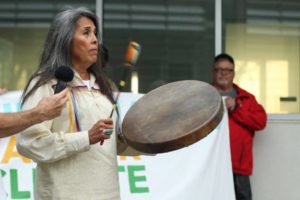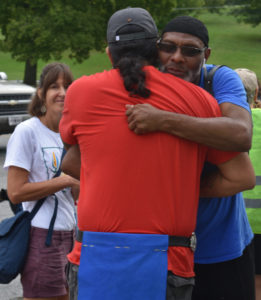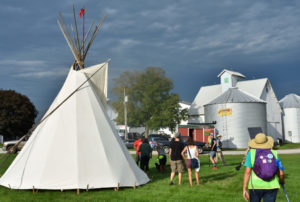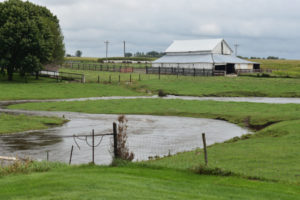This is Ed Fallon’s blog from Day One of the First Nation – Farmer Climate Unity March. The March was a joint effort of Bold Iowa and Indigenous Iowa and involved about 30 participants walking from Des Moines to Fort Dodge, following the path of the Dakota Access Pipeline.
Dear Friends,

Regina Tsosie starts the IUB press conference with a song. (Photo by Fintan Mason)
After a stormy night, marchers carpooled to the Iowa Utilities Board (IUB) for a press conference to announce the First Nation – Farmer Climate Unity March. Though the IUB was closed, we know board members are paying attention. It’s important for them to hear that they made the wrong decision when granting the authority to use eminent domain to build the Dakota Access Pipeline. Most Iowans agree. Iowa law agrees. Soon, we’ll see whether the Iowa Supreme Court agrees.

Manape LaMere (in red) embraces Ako Abdul-Samad (in blue) after both offer a blessing to send off marchers. (Photo by Jeff Kisling)
Blessings by Ako Abdul-Samad and Manape LaMere sent marchers off along the Des Moines River. Given last night’s storms — and a forecast for continued rain and cloud cover today — I wouldn’t have guessed that our biggest challenge today would be heat and humidity.
Halfway through the March, the day warmed considerably, with the heat index hovering around 90 degrees. One young marcher felt faint and had to sit in the shade before being rescued by one of our support vehicles. The conditions hit several older marchers hard, too, requiring extra breaks in the shade.
A welcome respite came at Sue and Tom Broadbooks home in Ankeny, where the family invited us in to cool off and enjoy home-made cookies. This was the first exceptional act of kindness and hospitality in a week that would see many gestures of goodwill toward us.

Our campsite at the Griffieon farm north of Ankeny. (Photo by Jeff Kisling)
Marchers made it through a difficult 13.2-mile day to enjoy a wonderful evening of food and conversation at the Griffieon farm. Half the marchers accepted the family’s generous offer to sleep in their machine shed. The rest of us braved a second night of severe weather in our tents.

Four-mile creek, near the Griffieon farm, looked more like a river today. (Photo by Jeff Kisling)
I’m a veteran tent-dweller, yet have never seen my tent pummeled so mercilessly by the driving rain that hit us in the middle of the night. It was as if buckets of water were being hurled against the sides of the tent. I worried that the nearby ditch between our tents and the road would fill with water and wash over the field where we were camped. That didn’t happen, but if our first night’s rainfall had been as bad as some storms that Iowa has seen in recent years, that field could have indeed been swamped. We were lucky — and reminded that, in the New Climate Era, the most marginalized populations are often the most at risk.
Ed Fallon
